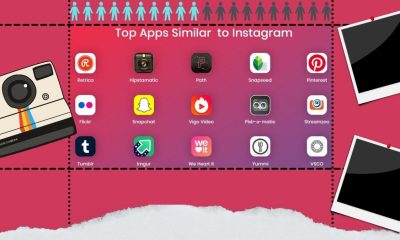Software Development
Top Cybersecurity Trends

As we are already in 2020, it’s obvious to think about what the future has in store for us. From a cybersecurity viewpoint, there are a lot of concerns to be answered.
How cybersecurity will behave this year and what risks will come to the surface?
Will attackers capitalize on new tools like AI and biometrics or will they focus on utilizing traditional systems in new ways? What will shape cybersecurity in 2020 and beyond?
By reviewing the cybersecurity happenings over the past couple of years, it is somehow possible to predict the things in cyber scenarios over the next 12 months.
From cybersecurity staff shortages to the AI’s role in cybersecurity, let’s have a quick look at key cybersecurity trends that are likely to define the digital landscape in 2020.
The Cybersecurity Talents Gap:
The tech industry is going through cybersecurity talent crises, even though security teams have to face more risks than ever.
Various studies have found that the shortage of skilled cybersecurity workforce is expected to hit 3.4 million unfilled positions by 2021, up from the current level of 2.93 million, with 500,000 of those vacancies in North America. This can worsen the problem, leading to possible data incidents not being investigated. Consequently, there will be a greater dependence on AI tools that can help organizations with fewer humans.
Automated security tools such as digital threat management solutions are increasingly becoming important to safeguarding the data. Modern products can enable even a small team to protect their websites and web apps, ensuring a technological solution to persistent cybersecurity talent concerns.
Starting of the New Cyber Cold War:
In 2017, American intelligence agencies confirmed the Russian government’s involvement in a campaign of hacking, fake news, data leaks to affect the American political process to benefit Donald Trump.
This is how the cyber-game is played among powerful nations. And this has led to a new kind of war which is termed as a cyber-cold war.
Cyber-attacks in smaller countries are reportedly sponsored by larger nations to establish their spheres of influence.
Moreover, critical infrastructure continues to be on the radar of cyber-attacks, as seen in attacks on South African and US utility companies. Countries are required to ponder over their cyber defenses around their critical infrastructure.
Hackers to Exploit Misconfigurations:
Former Amazon Web Services employee Paige Thompson was found guilty of accessing the personal information of 106 million Capital One credit card applicants and clients as well as stealing information from over 30 other enterprises. Thompson was also accused of stealing multiple TB of data from a variety of companies and educational institutions.
The investigators found that Thompson leveraged a firewall misconfiguration to access data in Capital One’s AWS storage, with a GitHub file containing code for some commands as well as information of over 700 folders of data. Those commands helped him get access to data stored in the folders over there.
The point is here that human errors in the configuration process can provide an easy entry to the cyber-criminals. Therefore, hackers are looking to make the most of this security vulnerability.
The Eminent Role of AI in Cybersecurity:
In 2016, AI was used to propagate fake news in the US elections. Special teams were used in a political campaign to create and spread fake stories to weaken the opponents. As we are gearing up for the 2020 elections, the use of AI is likely to take place once again.
As AI continues to be a major tool for cyber-crime, it will also be utilized to speed up security responses. Most security solutions are based on an algorithm based on human intellect, but updating this against the sophisticated risks and across new technologies and devices is challenging to do manually.
AI can be useful in threat detection and immediate security responses, helping to prevent attacks before they can do big damage. But it can’t be denied that cybercriminals are also leveraging the same technology to help them identify networks for vulnerabilities and create malware.
Cloud Security to Remain a Top Concern:
Cloud technology has been gaining momentum among all businesses over the years. After all, it ensures flexibility, collaboration, sharing and accessing. Simply put, you can share and access data from any part of the world, especially if you are on the go.
However, cloud technology is not immune to threats like data loss, leakage, privacy violation, and confidentiality. These threats will continue to plague cloud computing in 2020 too. No wonder the cloud security market is expected to hit $8.9 billion by 2020.
The cloud threats are mainly caused by poor management by the clients, rather than the service provider. For example, you require a password to access a basic cloud service that is shared with you or created by you. In case of using a weaker password, you are making your cloud account vulnerable to cybercrimes. Keep in mind that detecting such flaws in your cloud usage is not a big deal for today’s sophisticated cybercriminals. Besides, sensitive information should be placed in a private cloud that is safer than a public cloud.
State-Sponsored Cyber-attacks will Rock the World:
Advanced cyber-attacks sponsored by nation-state actors will have a profound impact. Cybercriminals who are unofficially backed by the state can unleash DDoS attacks, create high-profile data incidents, steal secrets and data, and silence some voices. As political tensions are increasing, these things are likely to go up—and managing security in such a scenario will require equally sophisticated solutions to detect and prevent vulnerabilities.
Bottom Line:
Cyber incidents are on the rise. They will be even more malicious this year as hackers are looking for new ways to discover vulnerabilities. That’s why cybersecurity should be the topmost priority for organizations. Pondering over the new risks will help you better prepare. What do you think? Let me know by commenting below.
-

 Marketing Tips1 day ago
Marketing Tips1 day agoWhat is my Instagram URL? How to Find & Copy Address [Guide on Desktop or Mobile]
-

 Business Imprint3 days ago
Business Imprint3 days agoAbout Apple Employee and Friends&Family Discount in 2024
-

 App Development2 days ago
App Development2 days agoHow to Unlist your Phone Number from GetContact
-

 News4 days ago
News4 days agoOpen-Source GPT-3/4 LLM Alternatives to Try in 2024
-

 Crawling and Scraping4 days ago
Crawling and Scraping4 days agoComparison of Open Source Web Crawlers for Data Mining and Web Scraping: Pros&Cons
-

 Grow Your Business1 day ago
Grow Your Business1 day agoBest Instagram-like Apps and their Features
-

 Grow Your Business4 days ago
Grow Your Business4 days agoHow to Become a Prompt Engineer in 2024
-
Marketing Tips1 day ago
B2B Instagram Statistics in 2024







